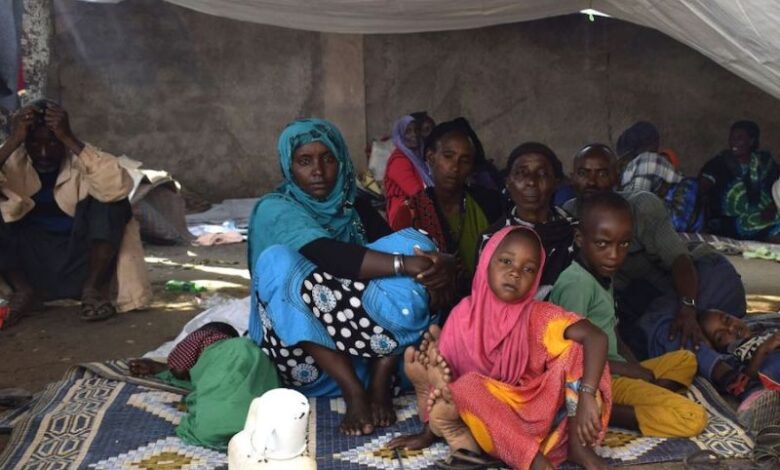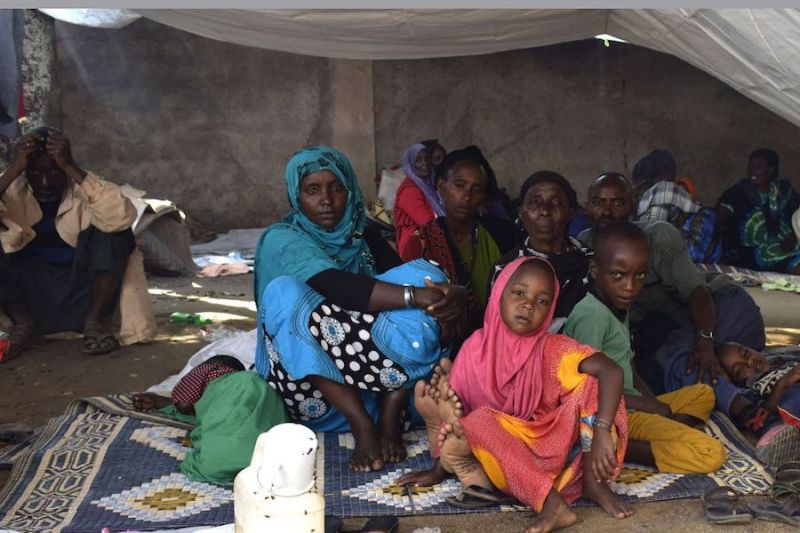U.S. bishops appeal to leaders to do more to ensure food security around the globe

 A family sits in a tent at camp for refugees at Kenya's border town with Ethiopia, Moyale, about 484 miles north of capital Nairobi, on March 17, 2018 after fleeing Ethiopia. / Brian Ongoro/AFP via Getty Images
A family sits in a tent at camp for refugees at Kenya's border town with Ethiopia, Moyale, about 484 miles north of capital Nairobi, on March 17, 2018 after fleeing Ethiopia. / Brian Ongoro/AFP via Getty Images Washington, D.C. Newsroom, Aug 7, 2023 / 15:40 pm (CNA).
In a statement issued Aug 7, the chairman of the United States Conference of Catholic Bishops’ (USCCB) Committee on International Justice and Peace called on global leaders to do more to ensure food security for all.
Bishop David J. Malloy of Rockford, Illinois, cited numbers from the World Food Programme (WFP), the global humanitarian organization addressing food security, that estimated about 258 million people in 58 countries experienced crisis-level acute hunger in 2022.
“Russia’s recent decision no longer to allow Ukraine to export tons of grain means more people are likely to go hungry,” said Malloy, who along with Pope Francis is calling on world leaders “to look beyond narrow national interests, focus on the common good, and join in ensuring that critical food supplies can flow to those most in need.”
Malloy pointed out that prior to the Russian invasion, Ukraine was considered “Europe’s breadbasket” and was the origin for large amounts of wheat, corn, and barley as well as almost half of the world’s sunflower oil — all flowing through ports on the Black Sea. Those ports were blocked when Russia invaded Ukraine.
Last June the Holy Father appealed for the end of the blockades that were preventing the flow of grain through Ukrainian seaports. Malloy’s statement provided more context for the timing of this latest appeal:
“From July 2022, the Black Sea Grain Initiative (BSGI), the U.N.-brokered agreement between Russia and Ukraine, allowed Ukraine to export about 33 million tons of grain and other agricultural products. Russia’s decision to withdraw from the BSGI and its bombing of grain storage facilities in Ukraine will greatly impact the availability of food supplies at a time when more people are in dire need of food. With the number of forcibly displaced people at a record high, the World Food Programme estimates 345 million people will face acute hunger this year, with 129,000 potentially facing famine in places like Afghanistan, Syria, Yemen, the Horn of Africa, and Myanmar.
As the statement acknowledged, the war in Ukraine is not the only reason food insecurity has risen globally over the last few years. Natural disasters, the pandemic, regional wars, and other conflicts have also contributed to high rates of hunger.
Haiti, for example, is in dire need. According to a U.N. report, a total of 4.9 million people — which is nearly half the population of the country — are experiencing acute food insecurity, and large numbers affected are children. The Guardian reported that the WFP will be unable to feed 100,000 Haitians this month because it has insufficient funding to meet the needs.
“Surging food inflation in Haiti means the cost of feeding each person has increased while the number of those in need of assistance has also grown, driving up the cost of delivering WFP aid,” the Guardian article reported.
On the other side of the world, northern Ethiopia is another nation suffering from acute food insecurity. Countries in the horn of Africa rely on Ukrainian grain, and the Tigray region is just emerging from one of the worst recent conflicts following two years of fighting between Ethiopia’s federal army and regional forces. The conflict has created millions of refugees; high rates of death, injury, and trauma; and widespread food insecurity. A persistent drought has made food scarcity even worse and earlier this summer the U.S. suspended food aid there due to reports that government officials were diverting food aid. More than 20 million people in Ethiopia rely on food assistance.
Bishop Malloy ended the appeal by the bishops with a poignant reminder that many of our brothers and sisters around the world are suffering. “The most vulnerable are crying in hunger. With the compassion of Christ, we need to heed their cries and help,” he said.






